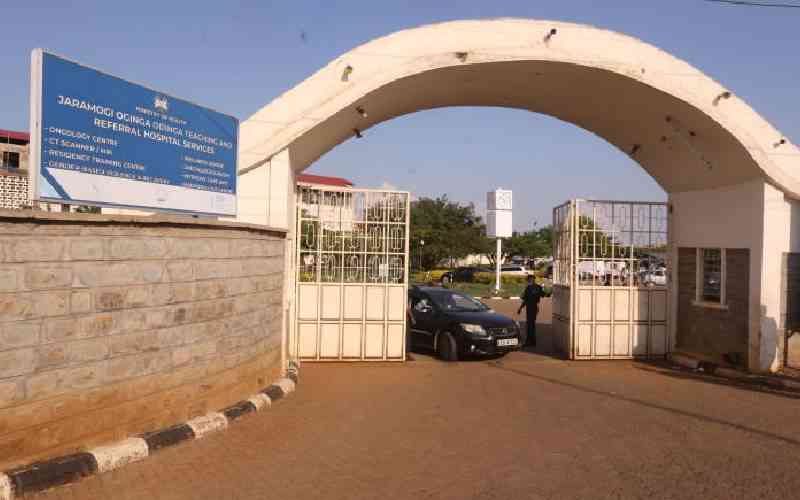
Millions of people around the world unknowingly live with a deadly trio: diabetes, high blood pressure and kidney disease. Often, they only realise the connection when it is too late.
Yet, medical experts stress that understanding the link between these conditions is crucial for prevention and early intervention especially for those at risk or caring for affected family members.
According to the Ministry of Health, diabetes has become a significant public health concern. In 2021, about 821,500 adults were diagnosed with diabetes, with approximately four per cent of the adult population affected.
The ministry notes that many people remain undiagnosed, with most cases being Type 2 diabetes, which typically develops in adulthood.
Diabetes occurs when the body struggles to produce or use insulin effectively, leading to high blood sugar levels.
According to Dr John Ngigi, head of the Nephrology and Kidney Transplant Unit at Nairobi West Hospital and chairperson of the Renal Association of Kenya, “Diabetes can affect small blood vessels. This can cause high blood pressure and also lead to kidney disease.”
This vicious cycle is further explained by Mohamed Hany Hafez of the African Association of Nephrology (AFRAN). ‘‘Diabetes weakens the kidneys’ ability to filter waste, while stiffening blood vessels, increasing blood pressure. High blood pressure, in turn, accelerates kidney disease, significantly raising the risk of heart complications.’’
One of the most alarming aspects of these conditions is their silent progression. “Most people with Type 2 diabetes don’t get diagnosed or start taking medication until about five years after developing the condition,” says Hafez. “High blood pressure is known as a ‘silent killer,’ and kidney disease often shows no symptoms until it is very advanced.”
The Kenya Renal Association (KRA) estimates that more than four million people in Kenya suffer from kidney disease, a number expected to rise to 4.8 million by 2030.
Diabetic nephropathy (kidney disease caused by diabetes) and hypertensive renal disease remain the leading causes of kidney failure.
Preventing kidney disease and managing diabetes requires lifestyle adjustments. The World Health Organization (WHO) recommends “staying physically active, monitoring blood sugar and blood pressure, maintaining a healthy diet, avoiding smoking and limiting the use of over-the-counter medications that can harm the kidneys.”
A well-balanced diet plays a critical role. According to the American Diabetes Association (ADA), individuals with diabetes should prioritise whole grains, vegetables, lean proteins and healthy fats while reducing their intake of processed foods, sugar-sweetened beverages and high-sodium meals.
Carbohydrates should come from high-fibre sources such as legumes, whole grains and non-starchy vegetables. Healthy fats, like those found in nuts, seeds and fish, should replace saturated fats from processed meats and fried foods. Meanwhile, consuming lean proteins like fish, poultry and plant-based alternatives supports overall health without burdening the kidneys.
Physical activity is also crucial. Engaging in at least 150 minutes of moderate exercise weekly can significantly improve insulin sensitivity, lower blood pressure and support kidney function. Walking, cycling, swimming and strength training are all beneficial activities for managing diabetes and hypertension.
Additionally, stress management plays a crucial role in preventing complications from diabetes and high blood pressure. Chronic stress can raise blood sugar levels and increase the risk of hypertension, which in turn affects kidney function. Practices such as meditation, yoga, deep breathing exercises and engaging in enjoyable activities can help lower stress levels and improve overall well-being.
Esther Nyota, who was diagnosed with diabetes and later developed end-stage kidney disease before undergoing a kidney transplant, highlights the importance of communication among healthcare providers. She recalls how one doctor’s prescription for one condition worsened another, forcing her to change doctors.
Ahmed Sokwala, a consultant nephrologist at Aga Khan University Hospital Nairobi, affirms that diabetes and high blood pressure are the leading causes of kidney disease. “Because more patients have diabetes and high blood pressure, we’re seeing more kidney disease,” he explains. Other risk factors include heart disease, smoking, obesity and ageing.
“Studies show that after the age of 40, kidney function begins to decline by approximately 1 per cent each year,” says Prof Sokwala.
 The Standard Group Plc is a multi-media organization with investments in media
platforms spanning newspaper print
operations, television, radio broadcasting, digital and online services. The
Standard Group is recognized as a
leading multi-media house in Kenya with a key influence in matters of national
and international interest.
The Standard Group Plc is a multi-media organization with investments in media
platforms spanning newspaper print
operations, television, radio broadcasting, digital and online services. The
Standard Group is recognized as a
leading multi-media house in Kenya with a key influence in matters of national
and international interest.











